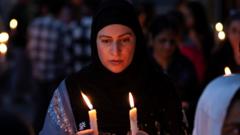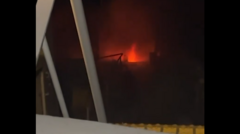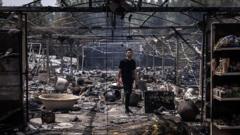As violence escalates in Syria's Druze regions, Israel has confirmed airstrikes near the presidential palace in Damascus. This military action, endorsed by Prime Minister Benjamin Netanyahu, aims to deter threats to the Druze community following deadly clashes instigated by sectarian tensions.
**Israel Targets Damascus Area Amid Escalating Druze Violence**

**Israel Targets Damascus Area Amid Escalating Druze Violence**
Israel conducts airstrikes near a Syrian presidential palace to signal protection for the Druze minority amidst sectarian strife.
---
Israel's recent military intervention near Damascus, targeting an area adjacent to the Syrian presidential palace, has emerged as a response to rising sectarian violence affecting the Druze community. Prime Minister Benjamin Netanyahu asserted that the action serves as a "clear message" to the Syrian government, emphasizing Israel's commitment to safeguard the Druze people, who have faced ongoing violence this week.
Netanyahu's statement stressed that Israel would not permit any hostile forces in the region, particularly south of Damascus. These concerns follow a week marked by severe clashes, notably in Druze-dominated areas such as Ashrafiyat Sahnaya, Jaramana, and Suweida, with reports indicating over 100 casualties, including both Druze and security personnel.
The Syrian government has remained largely silent following the airstrike, although it condemned what it labeled foreign aggression during prior Israeli strikes. Meanwhile, tensions flared after an audio clip containing derogatory remarks about the Prophet Muhammad circulated, igniting anger among Sunni Muslims and leading to violent confrontations.
Sheikh Hikmat al-Hijri, the Druze spiritual leader, described the situation as a "genocidal campaign" against his community, calling for international intervention to restore peace. In response, Syrian authorities have deployed security forces, framing their action as an effort to dismantle "outlaw groups" that instigated the clashes.
Despite the Syrian authorities’ reassurances, minority communities, including the Druze, fear for their safety in light of recent events, which have included mass killings and further violence led by new Sunni Islamist factions. Traditionally, the Druze, a sect that emerged from Shia Islam, are small in number within Syria but hold a unique cultural and religious identity, comprising approximately 3% of the population.
Israel's role in these conflicts has expanded in recent months, as its military has reportedly conducted hundreds of airstrikes to suppress Syrian military capabilities, especially in southern territories neighboring Israel. Netanyahu has publicly committed to demilitarizing areas near the Golan Heights that pose a strategic threat, particularly from groups like Hayat Tahrir al-Sham, a designated terrorist organization.
This escalation highlights the complexity of sectarian dynamics in Syria, as well as Israel's proactive stance amidst regional instability. As the situation evolves, it raises critical questions about the future of ethnic and religious minorities in Syria and the geopolitical implications of external interventions.
Israel's recent military intervention near Damascus, targeting an area adjacent to the Syrian presidential palace, has emerged as a response to rising sectarian violence affecting the Druze community. Prime Minister Benjamin Netanyahu asserted that the action serves as a "clear message" to the Syrian government, emphasizing Israel's commitment to safeguard the Druze people, who have faced ongoing violence this week.
Netanyahu's statement stressed that Israel would not permit any hostile forces in the region, particularly south of Damascus. These concerns follow a week marked by severe clashes, notably in Druze-dominated areas such as Ashrafiyat Sahnaya, Jaramana, and Suweida, with reports indicating over 100 casualties, including both Druze and security personnel.
The Syrian government has remained largely silent following the airstrike, although it condemned what it labeled foreign aggression during prior Israeli strikes. Meanwhile, tensions flared after an audio clip containing derogatory remarks about the Prophet Muhammad circulated, igniting anger among Sunni Muslims and leading to violent confrontations.
Sheikh Hikmat al-Hijri, the Druze spiritual leader, described the situation as a "genocidal campaign" against his community, calling for international intervention to restore peace. In response, Syrian authorities have deployed security forces, framing their action as an effort to dismantle "outlaw groups" that instigated the clashes.
Despite the Syrian authorities’ reassurances, minority communities, including the Druze, fear for their safety in light of recent events, which have included mass killings and further violence led by new Sunni Islamist factions. Traditionally, the Druze, a sect that emerged from Shia Islam, are small in number within Syria but hold a unique cultural and religious identity, comprising approximately 3% of the population.
Israel's role in these conflicts has expanded in recent months, as its military has reportedly conducted hundreds of airstrikes to suppress Syrian military capabilities, especially in southern territories neighboring Israel. Netanyahu has publicly committed to demilitarizing areas near the Golan Heights that pose a strategic threat, particularly from groups like Hayat Tahrir al-Sham, a designated terrorist organization.
This escalation highlights the complexity of sectarian dynamics in Syria, as well as Israel's proactive stance amidst regional instability. As the situation evolves, it raises critical questions about the future of ethnic and religious minorities in Syria and the geopolitical implications of external interventions.



















